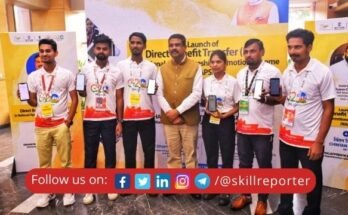New Delhi: Renewable energy sector is expected to be a major source of employment with 3 lakh new jobs being generated in next 3-4 years. Employment growth, along with emerging technologies necessitates capacity building in the sector and preparing a workforce that is apt to the industry requirement. However, the sector also sees a lot of challenges in hiring of apprentices.
Keeping in view the need to sensitize the industry on benefits of apprenticeship and Government of India’s National Apprenticeship Promotion Scheme (NAPS), Department for International Development (DFID), Government of UK in collaboration with National Skill Development Corporation (NSDC) and Ministry of Skill Development & Entrepreneurship (MSDE), organised a workshop for industry players from the renewable energy sector.
Ms Anu Gupta, Head of Skills, DFID briefed the audience on the various areas of technical collaboration under the Skills for Jobs Programme including the priority sectors of intervention, renewable energy being one of them. Ms Anita Srivastava, Joint Director, MSDE GoI, delivered a keynote address highlighting that Scale, Skills and Standards are the key for making the efforts of skilling successful in India. She further briefed the audience on the initiatives taken by MSDE to promote apprenticeship.
Mr. Praveen Saxena, CEO, Skill Council for Green Jobs in his message, urged the stakeholders to recommend ideas for promotion of apprenticeship in the sector. Acknowledging the challenges of the sector and the kind of work the renewable energy sector workforce does, he emphasised that there is still scope for organisations to encourage hiring of apprentices.
Ms. Pangkhuri from NSDC presented the key features of the Apprenticeship Act and NAPS. She also explained to participants how to register, hire and engage apprentices online through the NAPS portal. Ms. Shobha M. Ghosh, Assistant Secretary General, FICCI, mentioned that the awareness and sensitization workshops like this will encourage industry to hire apprentices. She also highlighted other actions such as merging of government schemes, a productivity study around cost and benefits of apprenticeship, tax incentives, etc. that could further promote apprenticeship. Mr Dhruv Mittal, Head Assessments, Eduvantage, made a presentation on the role of Third-Party Aggregators (TPAs) highlighting that TPAs are there to bridge the gap between Industry, Training Providers and Government.
The workshop saw the participation from over 30 industry partners including industry associations working in the renewable energy space, including the likes of IREDA, National Institute of Wind Energy (NIWE), NTPC, Renew Power Ltd, and Avaada. The session ended with a presentation and discussion on the proposed interventions in the Renewable Energy sector under the Skills for Jobs programme.



